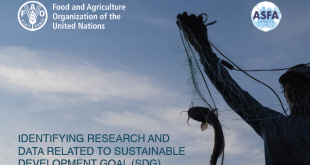The SEAFDEC Secretary-General, Ms. Malinee Smithrithee, and Policy and Program Coordinator of the SEAFDEC Secretariat, Dr. Worawit Wanchana, attended the “2022 United Nations Conference to Support the Implementation of Sustainable Development Goal 14: Conserve and sustainably use the oceans, seas and marine resources for sustainable development” which was convened from 27 June to 1 July 2022 in Lisbon, Portugal. During the Conference, the priority emerging ocean environmental issues that are of concern to mankind were addressed and solutions for a sustainably managed ocean involving green technology and innovative uses of marine resources using integrated, ecosystem-based approaches were highlighted. The Conference emphasized the main threats to the health, ecology, and economy of the ocean – climate change, marine plastics and pollution, unsustainable fishing, invasive species, and loss of marine habitats and biodiversity. Moreover, SEAFDEC disseminated leaflets to showcase SEAFDEC activities that address the issues related to marine pollution (ALDFG, microplastics, etc.), marine and coastal fisheries management approach using EAF, energy optimization, fisheries resource enhancement and utilization towards achieving the sustainable development goal 14 targets.
During the Interactive dialogue 1: Addressing marine pollution of the Conference, the emerging global concerns on marine pollution that made impacts on human health and ocean ecosystems were emphasized. The occurrence of abandoned, lost, or otherwise discarded fishing gear (ALDFG) from the fishing industry was one of the concerns addressed.
It was estimated that ghost gear was about 10 % of marine litter (more than 500,000 million t of fishing gear left in the ocean annually), comprising mainly of nets, lines, and ropes. Such abandoned fishing gear materials have been reported as ghost gears in many places and the trouble is not only for fish but also for many marine mammals. It is considered that these threats are affecting harvest loss, tourism, and the sustainable development of economics. Major solutions include improving/strengthening collaboration between key stakeholders including fishers, fishing gear producers, NGOs, researchers, governments and intergovernmental organizations, among others.
Furthermore, the negative impacts of marine pollution on the aquaculture production, including the effects on small-scale fisheries and women were mentioned. Stakeholders also reflected on the establishment and surveillance of marine protected areas (MPAs) which should be extended and adequately funded. Stakeholders referred also to the potential of transboundary and multilevel MPAs. A number of stakeholders also identified that the COVID-19 pandemic resulted in increased marine litter pollution due to the increased use of single-use plastics through disposal equipment, residential wastes, and others. It was also highlighted that the increase in the number of electric vessels will be a step closer to the decarbonization of sea transport. Another highlight was on the establishment of an international negotiating committee for agreement on the elimination of new marine pollutants and standardizing plastic credits by way of incentivizing the collection and recycling of plastic wastes. Conclusions were made on mobilization actions which will be built upon science-based innovative solutions.
The Conference was participated by the States Members of the United Nations, members of the specialized agencies and parties to the United Nations Convention on the Law of the Sea (UNCLOS); intergovernmental organizations, international financial institutions, and other international bodies; associate members of the regional commissions; organizations and bodies of the United Nations; and non-governmental organizations, civil society organizations, academic institutions, the scientific community, private sector, and philanthropic organizations.
 SEAFDEC Southeast Asian Fisheries Development Center
SEAFDEC Southeast Asian Fisheries Development Center
